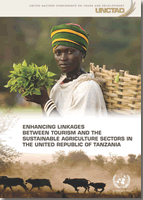
The United Republic of Tanzania has vast untapped natural resources, including an abundance of wildlife, unexploited mineral reserves and arable land, which offer a wide range of development opportunities.
Tourism and agriculture are important contributors to the development of the local economy. Many developing nations that are now experiencing rapid tourism growth have agrarian societies and tourism is the first or second source of export earnings.
For example, 20 out of the world’s 48 least developed countries (LDCs) rely on tourism and agriculture as the basis for the livelihoods of most of their inhabitants. It is imperative, therefore, that these sectors receive close attention, especially concerning the economic opportunity relationships that arise from tourism and sustainable agriculture.
The main objective of this report is to enhance the understanding of linkages between these two sectors, as well as propose suggestions for how they could be strengthened with the aim of promoting bottom-up sustainable development in the United Republic of Tanzania.
In order to promote sustainable development, this report proposes a set of potential thematic strategies that can be used as stepping-stones for building an institutional framework able to link the tourism and agriculture sectors at multiple levels – country, regional, local and community.
The thematic strategies are:
Awareness and capacity building: Raising awareness and building capacity to attain a high level of consciousness, understanding and ability in support of the implementation of linkages between tourism and agriculture are critical.
Start-up drivers (Utalii na Kilimo Kwanza): Selecting regions that can serve as multipliers based on successful local experiences such as the growth corridors initiative.
Public-private partnerships and destination level cooperation and action: The private and public sectors and destination stakeholders are key components in the implementation of pro-poor tourism (PPT) practices. Achieving the objectives of this strategy will rely on collective commitment, strategic partnerships, effective institutional arrangements and facilitating processes. The theme also addresses the lack of supportive funding and other mechanisms as a key constraint in improving linkages.
Effective promotion of pro-poor tourism and branding: This strategic theme focuses on the need for promotion of PPT products, experiences and destinations in the United Republic of Tanzania through an effective and robust marketing plans and branding.
These four themed strategies indicate ways to empower a cooperation platform linking tourism and agriculture in the United Republic of Tanzania. However, they require a detailed action plan, which should be developed by the national government together with local stakeholders, outlining interventions for each type of strategy.



